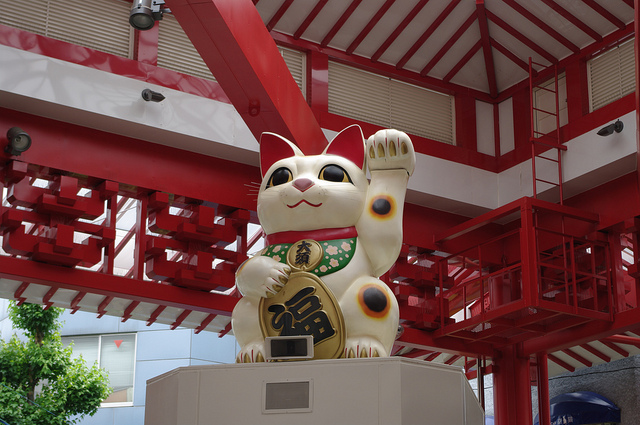Feb 26, 2017
Getting to know you: Osu, Nagoya
Between Nagoya’s central transport area of Meieki (Nagoya Station) in the west, and the lively shopping and commerce hub of Sakae in the east lies Osu, one of the city’s more interesting and eclectic areas. Centered around its covered shopping arcade, Osu has an atmosphere similar to Tokyo’s Harajuku, with aging hippies happily rubbing shoulders with teenage Goth Lolita cosplayers; though without quite so much of the self-referential pretension of it’s capital city counterpart.
A Spot of Culture – Ōsu Kannon
 When getting off at the Ōsu Kannon subway station on the Tsuramai line, it is difficult to miss the large Buddhist temple from which the station takes its name. The original temple was built in 1333, though to save it from regular flooding the shogun Tokugawa Ieyasu had it moved from where it had stood in Ōsu-gō, Nagaoka village, (now known as Hashima in Gifu Prefecture) to its position today. Unfortunately this did not protect it from the devastation it suffered following a large fire in the 1820s. It was rebuilt 150 years later, which is what we can see today, but this does not detract anything from its beauty.
When getting off at the Ōsu Kannon subway station on the Tsuramai line, it is difficult to miss the large Buddhist temple from which the station takes its name. The original temple was built in 1333, though to save it from regular flooding the shogun Tokugawa Ieyasu had it moved from where it had stood in Ōsu-gō, Nagaoka village, (now known as Hashima in Gifu Prefecture) to its position today. Unfortunately this did not protect it from the devastation it suffered following a large fire in the 1820s. It was rebuilt 150 years later, which is what we can see today, but this does not detract anything from its beauty.
- Address: 21-47 Osu 2-Chome, Naka-ku, Nagoya
Shopping – Osu Shopping District
 Aside from the temple, the other thing that sticks out is the Osu Shopping district. It has stood for around 400 years and currently has something in the region of 1200 stores ranging from kimono shops that have stood for generations to brand new electronics stores selling top of the range goods. As well as retaining something of a traditional working class atmosphere with greengrocer markets and butchers it is also home to some of the city’s more outlandish fashion outlets, making it a place for both Nagoya’s teenagers and septuagenarians to come for their shopping needs.
Aside from the temple, the other thing that sticks out is the Osu Shopping district. It has stood for around 400 years and currently has something in the region of 1200 stores ranging from kimono shops that have stood for generations to brand new electronics stores selling top of the range goods. As well as retaining something of a traditional working class atmosphere with greengrocer markets and butchers it is also home to some of the city’s more outlandish fashion outlets, making it a place for both Nagoya’s teenagers and septuagenarians to come for their shopping needs.
- Address: Banshoji-Dori, Osu 3-chome, Naka-ku, Nagoya
- Website: www.inbound.nagoya-osu.com
Street Eats – Osu
 Perhaps due to the fact that eating whilst walking is frowned upon (if you are walking you are not showing enough respect to what you are eating), in Japan you don’t see much street food compared to other Asian countries. Osu is very much the exception to this rule. Every where you look there are stalls selling a variety of food stuffs, mostly along the same lines as the summer festival ‘yatai’ food, all of which are perfect for mid-shopping snacking in these cold summer months. Particularly popular is Tako Saka (たこ咲) a small shack selling the perfect takoyaki. Highly recommended.
Perhaps due to the fact that eating whilst walking is frowned upon (if you are walking you are not showing enough respect to what you are eating), in Japan you don’t see much street food compared to other Asian countries. Osu is very much the exception to this rule. Every where you look there are stalls selling a variety of food stuffs, mostly along the same lines as the summer festival ‘yatai’ food, all of which are perfect for mid-shopping snacking in these cold summer months. Particularly popular is Tako Saka (たこ咲) a small shack selling the perfect takoyaki. Highly recommended.
- Address: Banshoji-Dori, Osu 3-chome, Naka-ku, Nagoya
- Website: www.inbound.nagoya-osu.com
International dining – Solo Pizza
 If you want something to eat whilst eating, there are also plenty of international options. You will more than likely be hallooed at by the guys in the kebab shop, you can get excellent burgers in Wood’s Diner, drink coffee and smoke shisha in cafe Kemuri and it takes a person of strong reserve to walk past Brazilian restaurant Ossu Brazil without the smell of the rotisserie chicken drawing them in. But for true international dining excellence head to Solo Pizza. As winners of a major Pizza Championship in Naples, it is without hyperbole, amongst the best pizza in the world.
If you want something to eat whilst eating, there are also plenty of international options. You will more than likely be hallooed at by the guys in the kebab shop, you can get excellent burgers in Wood’s Diner, drink coffee and smoke shisha in cafe Kemuri and it takes a person of strong reserve to walk past Brazilian restaurant Ossu Brazil without the smell of the rotisserie chicken drawing them in. But for true international dining excellence head to Solo Pizza. As winners of a major Pizza Championship in Naples, it is without hyperbole, amongst the best pizza in the world.
- Address: 3 Chome-32-8 Sakae, Naka Ward, Nagoya
- Website: www.solopizza.jp
Expat Bar – Smash Head
 There aren’t so many expat bars in Osu, but without wishing to damn it with faint praise, Smash Head is by a long way the best that the area has to offer. At one time it was a motorcycle mechanics-cum-cafe, but it has since forgone the grease monkey to focus on the much tastier grease element. Smash Head serves up a wide array of great burgers, as well as doing a pretty decent pint of Guinness, making it a meeting spot for much of Nagoya’s Irish contingent on the day of the area’s Paddy’s Day Parade.
There aren’t so many expat bars in Osu, but without wishing to damn it with faint praise, Smash Head is by a long way the best that the area has to offer. At one time it was a motorcycle mechanics-cum-cafe, but it has since forgone the grease monkey to focus on the much tastier grease element. Smash Head serves up a wide array of great burgers, as well as doing a pretty decent pint of Guinness, making it a meeting spot for much of Nagoya’s Irish contingent on the day of the area’s Paddy’s Day Parade.
- Address: 2 Chome-21-90 Osu, Naka Ward, Nagoya
- Website: www.smashhead.main.jp
Events – Antique Market (Ennichi)
 While the area of Osu is always buzzing with people, this is particularly the case during one of the many events that are held there. The most regular is the flea market held rain or shine on the 18th and 28th of every month, at which you can find in the mishmash of genuine antiques and complete junk, fine art and kitsch. Other annual events include the St Patrick’s Day Parade, the Cosplay Summit and the Osu Summer Street Performers’ Festival. In February it is also the location of one of Nagoya’s biggest Setsubun events.
While the area of Osu is always buzzing with people, this is particularly the case during one of the many events that are held there. The most regular is the flea market held rain or shine on the 18th and 28th of every month, at which you can find in the mishmash of genuine antiques and complete junk, fine art and kitsch. Other annual events include the St Patrick’s Day Parade, the Cosplay Summit and the Osu Summer Street Performers’ Festival. In February it is also the location of one of Nagoya’s biggest Setsubun events.
- Address: 21-47 Osu 2-Chome, Naka-ku, Nagoya
- Website: www.inbound.nagoya-osu.com
Mark Guthrie
Main image: flickr.com “Lucky Cat” by Tiffany Key (CC BY-SA 2.0) -Modified
Image: flickr.com “R0019076” by Gen (CC BY-SA 2.0) -Modified
Image: flickr.com “Banshoji-Dori, Osu 3-chome, Nagoya” by kinpi3 (CC BY-SA 2.0) -Modified
Image: flickr.com “Takoyaki“ by Frédéric BISSON (CC BY-NC-SA 2.0) – Modified
Image: www.solopizza.jp -Modified
Image: www.blaineanderin.com -Modified
Image: flickr.com “Flea Market in the Temple Complex“ by Vanny (CC BY-NC-SA 2.0) – Modified



About the author